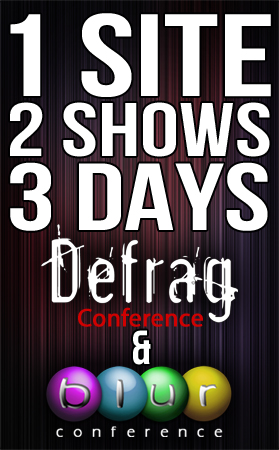I was musing on my morning walk about the similarities between the very first Digital ID World (2002) and the very first Defrag (in 4 weeks).
The first DIDW (as we took to calling it) gathered together anyone we could find that was interested in digital identity. There were some formal groups around (Liberty Alliance), and some very early topical treatments at other conferences (Catalyst - the other major “identity” show was then still a meta-directory conference), but really nothing that firmly addressed “identity.”
We were early enough in the cycle of things that 99% of the presentations at the first DIDW all began the same way: with a definition of “identity.”
There were a couple of hundred people there, and we were a little unsure of if the whole thing could be pulled off, but (oddly) it worked.
From that first year, so many unintended things happened (between years 2-3 of the conference):
1. Exhibitors that took the leap with us got acquired on a regular basis (some -like Wavset [acquired by Sun] can pin their acquisition directly to DIDW).
2. The topic moved from a “defnition” stage to a early product stage to actual real-life deployments.
3. Significant progress occurred around “identity thinking” — specifically, the impetus for things like Kim Cameron’s “7 laws of identity” came out of DIDW, and resulted in all of the OpenID work that you see today.
4. Successful startups like Ping Identity, Radiant Logic, Courion, Sxip Identity, Maxware, etc got their feet underneath them at the show.
Can DIDW take *sole credit* for all of this? Of course not. But the thing that I was musing about this morning was just how many of the really important folks in identity were either AT year 1, or heard the noise and came to year 2. The ripples of us doing something crazy (launching a conference about a topic that no one seemed to understand at the precise time when Comdex was going bankrupt) really did move out across the pond. Folks made money, enterprises had success and (pfff! insert keyser soze reference here) — just like that — the idea that “identity” couldn’t have its own conference was *gone.*
The feelings of analogy between Defrag and that first DIDW are very strong for me — which is significant if only because some other shows that I’ve launched or worked on did NOT give me the same sense. I guess that’s why I’m feeling compelled to write this.
My point is simple: While I cannot know what will come out of Defrag, my sense is that it will be similar to DIDW. If I’m at all right, then a self-perpetuating community will form — and an entire ecosystem (dare I say “niche industry”) will come to be.
Will Defrag be responsible for this? Absolutely not. The people there will be.
If you’ve ever wondered what it is like to see the birth of something, well, I think you’ve got a chance to see it very soon.
Enough musing — back to work! ![]()

